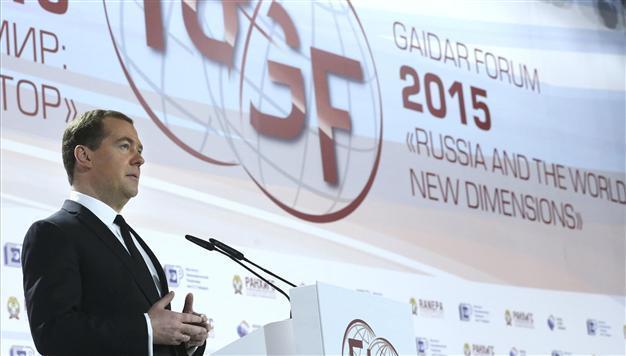Russia will not cut itself off from world: Medvedev
MOSCOW - Reuters

Russian Prime Minister Dmitry Medvedev delivers a speech as he attends the Gaidar Forum 2015 "Russia and the World: New Dimensions" in Moscow, January 14, 2015. REUTERS Photo
Russia will not cut itself off from the world because any return to the past would be a “monstrous mistake,” Prime Minister Dmitry Medvedev said Jan. 14.Medvedev, whose country has been hit by Western sanctions over the Ukraine crisis that have aggravated an economic crisis, told a conference the Central Bank had all the instruments it needed to secure the stability of the ruble.
He said the Central Bank would not “eat up” Russia’s foreign exchange reserves and ruled out capital controls. He said Russia did not want Ukraine to default but Kiev should pay its debts.
At the same time, Russia’s finance minister called for a cut in planned spending to weather an economic crisis, warning of a more than $45 billion drop in revenues this year if the average oil price is $50 a barrel.
In comments underlining the government’s growing concern at the downturn, Finance Minister Anton Siluanov said all budget expenditure should be cut by 10 percent except defense, a priority for President Vladimir Putin.
Adding to the gloom, Economy Minister Alexei Ulyukayev said there was a “pretty high” chance Russia’s credit rating would be downgraded to junk and a deputy, Alexei Vedev, said he expected inflation to peak at 15-17 percent in March/April.
A steep fall in the ruble, low prices for its main oil export and Western sanctions over Moscow’s role in the Ukraine crisis have hit Russia’s economy hard, and Siluanov said overall expenditure in 2015 must increase by 5 percent, not the 11.7 percent previously budgeted.
“The state cannot have the kind of spending it used to have with economic growth ... (and) with the oil price at $100 per barrel,” Siluanov told a conference of state officials, economists and business chiefs.
But with Russia being starved of investment, pressure is mounting for stronger government action to pull it out of crisis.
“We need a radical turn in economic policy,” said German Gref, the head of Russia’s biggest bank, Sberbank, demanding a “breakthrough” to improve the dire investment climate, stymied by state pressure on business and weak rule of law.
Ulyukayev also highlighted the problems facing small and medium businesses, saying they must be supported to try to spur Russia’s oil-dependent economy, which the World Bank expects to contract by 2.9 percent this year.
“The global economy will never again be what it used to be in 2000-07 and the situation in Russia will never be the same,” Ulyukayev said, referring to the economic boom years under Putin when the global oil price soared. “It will be much more complicated. It already is much more.”
Russia’s 2015 budget was based on an oil price of $100 a barrel but prices are now close to six-year lows at just above $46 a barrel.
“Regardless of having already curbed 2015 spending, we will ask parliament to cut by 10 percent all expenditure apart from defense spending,” Siluanov added.
He said Russia needed to husband its reserves to overcome difficulties as the price of oil looked set to continue at low levels. The ruble, which fell about 40 percent against the dollar in 2014, has also continued its decline this year.
“We think that with the (average) oil price at $50 per barrel (in 2015) ... we will lose some 3 trillion rubles in revenues,” he said.
Siluanov said the Reserve Fund, a rainy day fund of around $90 billion to cover budget holes, would be increased by 370 billion rubles ($5.60 billion) from last year’s savings, but Russia would need to spend more than 500 billion rubles from it in 2015 to cover the budget gap.
The 500 billion, currently invested in foreign currency assets, would be converted gradually on the forex market.
Siluanov said the ministry could invest part of the Reserve Fund in ruble bank accounts to take advantage of the weak ruble and earn high interest.
“We need to have a lot more resources so as not to spend, not to burn up the reserve funds,” he said.
















